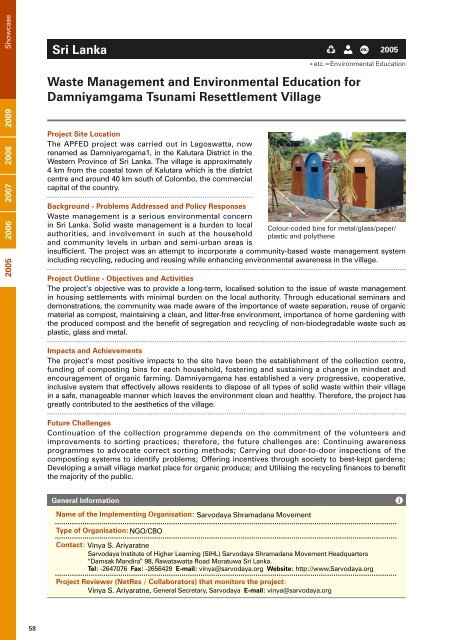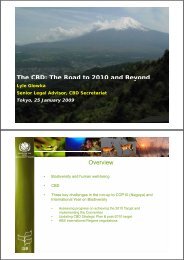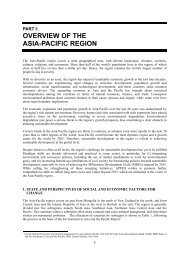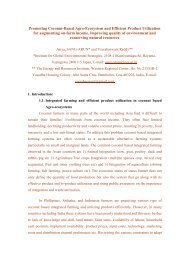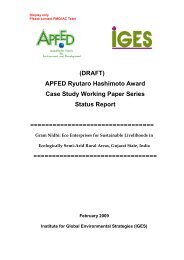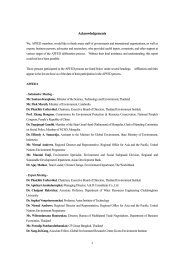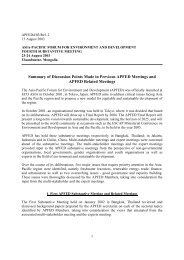APFED Booklet on Good Practices and Innovative Activities 2005 ...
APFED Booklet on Good Practices and Innovative Activities 2005 ...
APFED Booklet on Good Practices and Innovative Activities 2005 ...
Create successful ePaper yourself
Turn your PDF publications into a flip-book with our unique Google optimized e-Paper software.
<strong>2005</strong> 2006 2007 2008 2009 Showcase<br />
Sri Lanka<br />
Project Site Locati<strong>on</strong><br />
The <str<strong>on</strong>g>APFED</str<strong>on</strong>g> project was carried out in Lagoswatta, now<br />
renamed as Damniyamgama1, in the Kalutara District in the<br />
Western Province of Sri Lanka. The village is approximately<br />
4 km from the coastal town of Kalutara which is the district<br />
centre <strong>and</strong> around 40 km south of Colombo, the commercial<br />
capital of the country.<br />
Background - Problems Addressed <strong>and</strong> Policy Resp<strong>on</strong>ses<br />
Waste management is a serious envir<strong>on</strong>mental c<strong>on</strong>cern<br />
in Sri Lanka. Solid waste management is a burden to local<br />
authorities, <strong>and</strong> involvement in such at the household<br />
<strong>and</strong> community levels in urban <strong>and</strong> semi-urban areas is<br />
etc. <strong>2005</strong><br />
*etc.=Envir<strong>on</strong>mental Educati<strong>on</strong><br />
Waste Management <strong>and</strong> Envir<strong>on</strong>mental Educati<strong>on</strong> for<br />
Damniyamgama Tsunami Resettlement Village<br />
Colour-coded bins for metal/glass/paper/<br />
plastic <strong>and</strong> polythene<br />
insufficient. The project was an attempt to incorporate a community-based waste management system<br />
including recycling, reducing <strong>and</strong> reusing while enhancing envir<strong>on</strong>mental awareness in the village.<br />
Project Outline - Objectives <strong>and</strong> <strong>Activities</strong><br />
The project’s objective was to provide a l<strong>on</strong>g-term, localised soluti<strong>on</strong> to the issue of waste management<br />
in housing settlements with minimal burden <strong>on</strong> the local authority. Through educati<strong>on</strong>al seminars <strong>and</strong><br />
dem<strong>on</strong>strati<strong>on</strong>s, the community was made aware of the importance of waste separati<strong>on</strong>, reuse of organic<br />
material as compost, maintaining a clean, <strong>and</strong> litter-free envir<strong>on</strong>ment, importance of home gardening with<br />
the produced compost <strong>and</strong> the benefit of segregati<strong>on</strong> <strong>and</strong> recycling of n<strong>on</strong>-biodegradable waste such as<br />
plastic, glass <strong>and</strong> metal.<br />
Impacts <strong>and</strong> Achievements<br />
The project’s most positive impacts to the site have been the establishment of the collecti<strong>on</strong> centre,<br />
funding of composting bins for each household, fostering <strong>and</strong> sustaining a change in mindset <strong>and</strong><br />
encouragement of organic farming. Damniyamgama has established a very progressive, cooperative,<br />
inclusive system that effectively allows residents to dispose of all types of solid waste within their village<br />
in a safe, manageable manner which leaves the envir<strong>on</strong>ment clean <strong>and</strong> healthy. Therefore, the project has<br />
greatly c<strong>on</strong>tributed to the aesthetics of the village.<br />
Future Challenges<br />
C<strong>on</strong>tinuati<strong>on</strong> of the collecti<strong>on</strong> programme depends <strong>on</strong> the commitment of the volunteers <strong>and</strong><br />
improvements to sorting practices; therefore, the future challenges are: C<strong>on</strong>tinuing awareness<br />
programmes to advocate correct sorting methods; Carrying out door-to-door inspecti<strong>on</strong>s of the<br />
composting systems to identify problems; Offering incentives through society to best-kept gardens;<br />
Developing a small village market place for organic produce; <strong>and</strong> Utilising the recycling finances to benefit<br />
the majority of the public.<br />
General Informati<strong>on</strong><br />
Name of the Implementing Organisati<strong>on</strong>: Sarvodaya Shramadana Movement<br />
Type of Organisati<strong>on</strong>: NGO/CBO<br />
C<strong>on</strong>tact: Vinya S. Ariyaratne<br />
Sarvodaya Institute of Higher Learning (SIHL) Sarvodaya Shramadana Movement Headquarters<br />
“Damsak M<strong>and</strong>ira” 98, Rawatawatta Road Moratuwa Sri Lanka.<br />
Tel: -2647076 Fax: -2656429 E-mail: vinya@sarvodaya.org Website: http://www.Sarvodaya.org<br />
Project Reviewer (NetRes / Collaborators) that m<strong>on</strong>itors the project:<br />
Vinya S. Ariyaratne, General Secretary, Sarvodaya E-mail: vinya@sarvodaya.org<br />
58


